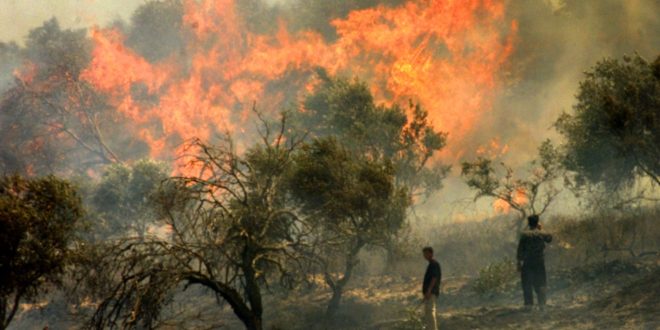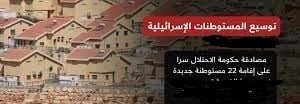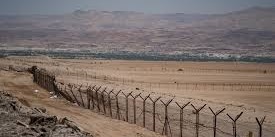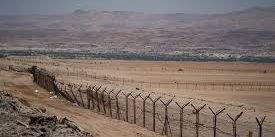By: Madeeha Al-A’raj
The National Bureau for defending land and resisting settlements ( nbprs ) stated in its latest weekly report , that the Palestinian Ministry of Agriculture has set Oct. 7th this year as an official date for the start of the olive harvesting season in Palestine. At the same time, settler and the occupation soldiers prevent the Palestinian from picking their olive in some countryside despite the spread of the Covid 19.I t should be nited that the season in these areas has turned into war and confrontation with settlers aiming to inflict losses upon them. Although this season comes in light of the spread of the Corona pandemic, settler gangs and the occupation forces have found an appropriate opportunity to tamper and harm the Palestinians by burning trees or preventing farmers from reaching their lands or by assaulting them and stealing their olives, exploiting the absence of international solidarity campaigns that were organized every year with the participation of hundreds of foreign volunteers, who were unable to reach Palestine due to the consequences of the Coronavirus.
The season began this year when settlers set fire to old olive trees in the village of Safa, west of Ramallah, by throwing Molotov cocktails, which caused widespread fires that destroyed hundreds of olive trees, in the areas of Wadi Al-Malaki, Al-Kursana, Batin Hariz, and Batin Al-Hump. The occupation authorities colluded with the settlers by preventing the citizens and owners of the lands behind the annexation wall and the racial expansion from entering their lands to put out the fires and save their trees. In the Hebron governorate, a group of settlers cut olive trees near the “Mtsi Yair” settlement, located east of the town of Yatta, south of Hebron, specifically in the area of Qawais. In Hiwara town, south of Nablus, six residents also sustained injuries as a result of an attack by more than thirty settlers from the settlement. Yitzhar during the process of picking olives in the Jabal Al-Lahef area on the first day of the Faza’a Campaign, which aims to support the landowners in the olive season. Settlers were not satisfied with that, but rather set fire to a number of olive trees before leaving the place, and in a more violent attack, the town of Deir Ballut in the Salfit governorate was subjected to attacks by settlers. 124 dunums planted with hundreds of old olive trees that are over a hundred years old, in addition to settlers stealing olives in the same area.
In conjunction with this, it was revealed last week that the Israeli occupation army issued 63 military orders to close areas and lands planted with olives with an area of 3000 dunums in separate parts of the West Bank, as of the start of the olive harvest season. The military orders bore the signature of the commander of the occupation army in the West Bank on Sept. 17th, 2020, and came under the title ‘Closing down an area – preventing entry and stay.’ The military orders were attached to maps and aerial photographs showing the locations of the lands targeted by those orders, most of which are lands planted with olives, which means that they are clearly targeting the current olive season, while the terms of the military orders made it clear that their entry into force will be from the date of their signature until the last day of the current year. The military orders targeted lands planted with olive trees in separate areas of the Hebron, Bethlehem, Ramallah, and Nablus governorates and indicated that these lands are considered vital areas. New military orders released the hands of soldiers to carry out these orders with ‘reasonable force.’ The occupation authorities expelled a number of olive pickers from their lands in the village of Awarta in the eastern region of the village, and prevented them from continuing to pick olives under the pretext of lack of coordination to work there.
In the ongoing settlement plans, the Higher Planning Council of the Civil Administration will hold a meeting this week to approve final settlement construction projects for about 2,500 housing units in a number of settlements, in addition to pushing the procedures for building 2000 housing units to the stage of depositing their plans. It seems clear that some of the building plans that will be approved or pushed for are in practice the legalization of buildings that were builta without building permits, and some of the building plans aim to prevent the possibility of expanding Palestinian towns. Also, some of these building plans will be implemented in isolated settlements that are closer to outposts on what US President Donald Trump’s vision calls the Palestinian state stipulated in the US plan.
According to the Israeli plans, 121 new housing units will be built in “Yitzhar” settlement, south of Nablus, 64 housing units in “Telem” settlement, 215 housing units in “Asbar” settlement and 14 housing units in “Maale Mechmash” settlement. The plans call for building 141 housing units in the “Shilo” settlement north of Ramallah. Those units will be established in the north of the settlement, between the Palestinian villages of Qariot and Jalud. The construction of 120 hotel rooms will be approved in the settlement Fatail adjacent to the Palestinian town of Fasil in the Jordan Valley, and a park in the settlement, and were built without permits in in 2016. The construction of 357 housing units in the settlement of Geva Binyamin will be finally approved. Northeast Jerusalem, and 354 housing units in Nili settlement in the middle of the West Bank, and 346 housing units in Beit El settlement, besides the legalization of 36 housing units built without a permit in the settlement itself, 952 housing units in Har Gilo, south of Jerusalem. This plan will prevent the expansion of the Palestinian village of Walaja. A plan to build 629 housing units in “Ali” settlement, midway between Nablus and Ramallah, will also be approved, some of them will be legalized after they have been built without permits. The Supreme Planning Council will discuss pushing plans to build 2,910 other housing units in the settlements. Hebrew sources previously reported that the Supreme Planning Council would approve the construction of 5,400 new housing units, according to instructions issued by the Israeli PM Netanyahu, and more than half of them 2,929 units will be built in the Beitar Illit Haredi settlement.
On the other hand, settlers established an “agricultural” settlement outpost in the northeastern region in the lands of Beit Dajan, east of Nablus. In recent days, settlement activity were approved to open roads and paths from the outskirts of the Hamra settlement in the Middle Valleys to Beit Dajan, as an introduction to controlling thousands of dunams. The nearby Elon Moreh settlement extended water lines to supply the new outpost with water.
List of Israeli Assaults over the Last Week, Documented by the National Bureau:
Jerusalem:
- Closing Jerusalem and impose a complete siege on it for the second week in a raw under the pretext of limiting the spread of Corona virus. Tightening and preventing Palestinians from praying in Al Aqsa Mosque.
- Intensifying the intrusions into the Al-Aqsa Mosque during the ‘Al-Arsh’ and ‘Farhit Al-Torah’ Eids, mobilize their efforts on all social media pages and through direct connect and text messages.
- Performing prayers on Al-Wad Street in Old Jerusalem on the occasion of the “Jewish Throne Day”, guarded by the Israeli police who placed iron barriers around settlers.
Nablus:
- Closing the road linking the Qasra and Jalloud towns, south of Nablus, with soil blocks as the area is subjected to shoveling the citizens’ lands from time to time to expand the Israeli settlements.
- Wounding two Palestinian while carrying out a geometric survey of the Al-Lahf area in the Hawara town, they were admitted to the hospital as well.
- Attacking Palestinian vehicles with stones, damaged number of them south of Nablus between the Burin and Hawara towns.
Salfit:
- Bulldozing a 124 dunums land, planted with olive trees in the Masha village in the west of Salfit in the Wadi al-Shami area behind the Separation Wall.
- Bulldozing and demolishing agricultural lands in the area behind the wall west of the Zawiya town in the Kheila al-Kuzbara and the Wadi Anjasat areas.
- Torching 50 olive trees in the Bab al-Marj area in the east of the Deir Balout area.
- Burning a number of forest trees and almonds near the Lichm settlement, it should be noted that the area was previously bulldozed and confiscated, moreover, most of the citizens building there were notified to be demolished.
Tulkarm:
- Bulldozing the citizens’ lands behind the separation wall in the Qaffin village, north of Tulkarm. A number of farmers expressed their fear that these actions are a prelude to establish an Israeli camp.
Jordan Valley:
- Seizing a bulldozer during its work in a water pool in the Beit Dajan area in the middle valleys.
- Fencing lands in the Al-Farisiyah area in the northern valleys two months ago.
- Seizing a bulldozer during its work in an agricultural road, in the Ein Al-Baida village.
 المكتب الوطني للدفاع عن الارض ومقاومة الاستيطان منظمة التحرير الفلسطينية
المكتب الوطني للدفاع عن الارض ومقاومة الاستيطان منظمة التحرير الفلسطينية




